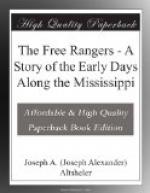But the loss of life even if the attempt were a success, would be terrible. That was apparent to everybody and Henry made a suggestion.
“Let’s concentrate our whole fire upon the ship,” he said. “Mass the cannon and the rest of us will back them up with our rifles. Maybe we can silence her, and if we do then’s the time to take her by storm.”
The supply fleet drew back and its fire died. It seemed, in truth, as if it were beaten and that, hemmed in by fire, as it were in the narrow bayou, it must surrender. A tremendous shout of triumph burst forth from the men on the schooner, and the Indians took it up in a vast and shriller but more terrible chorus.
Then came one of those sudden and ominous silences that sometimes occur in a battle. The fire of the Americans ceasing, that of their enemies ceased for the moment also. But the pause was more deadly and menacing in its stillness than all the thunder and shouting of the combat had been. It seemed unnatural to hear again the sighing of the wind through the forest and the quiet lap of water against the shore. The bank of smoke, no longer increased from below, lifted, thinned, broke up into patches, and began to float away. The moon’s rays shot through the mists and vapors once more, and lighted up the watery battlefield of the night, the schooner, the desperate men on it, the swarms of canoes, the coppery, high-cheeked faces of the Indians, the supply fleet packed now in a rather close mass, the tanned faces of the men on board it, animated by the high spirit of daring and enterprise, the wounded lying silent in the boats, and the wreckage floating on the bayou.
But the stillness endured for only a few moments. It was broken by the American fleet, which seemed to draw itself together into closer and more compact form. An order in a low tone, but sharp and precise, was carried from boat to boat, and it seemed to strengthen the men anew, heart and body. They straightened up, signs of exhaustion passed from their faces, and every one made ready all the arms that he had.
Paul, like the others, had felt the sudden silence, but perhaps most acutely of all. His whole imaginative temperament was on fire. He knew—he would have known, even had he not heard—that the sudden cessation of the firing was merely preliminary, a fresh drawing of the breath as it were for another and supreme effort. He clasped his hands to his temples, where the pulses were beating rapidly and heavily, and his face burned as if in a fever. But it was a fever of the mind not of the body.
“It’s a big battle, Paul,” said Shif’less Sol, who had come with Tom Ross into their boat, “but it’s wuth it. The arms and other things that we carry in these boats may be wuth millions an’ millions to the people who come after us.”
“Do you think we’ll ever break through, Sol?” asked Paul.
“Shorely,” replied the shiftless one. “Henry’s got the plan, and we’re goin’ to cut through like a wedge druv through a log. Something’s got to give. Up, Paul, with your gun! Here she goes ag’in!”




